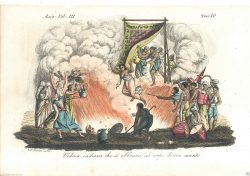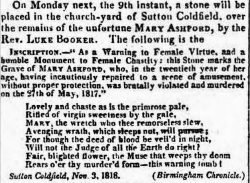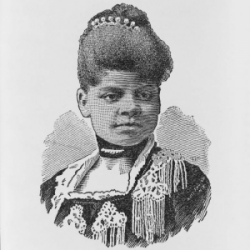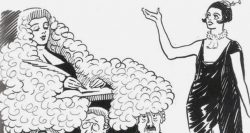By Annabelle Katumba “It is men only men, from the first to the last, that we have to do with! To please a man I did wrong at first, then I was flung about from man to man…By men we are examined, handled, doctored and messed with. In hospital it is a man again who … Continue reading “The Birmingham Ladies Association for the Care of Friendless Girls”
Category: Uncategorised
James Peggs and The Coventry Society for the Abolition of Human Sacrifices in India
By Laban Gabiddon ‘Nineteenth-century British India was marked by a series of debates on reforming the status of women. The first and most sensational public debate was concerned with outlawing sati.’[1] James Peggs was one of the first Baptist missionaries to arrive in Bengal along with his wife in 1822.[2] Peggs was appalled by the … Continue reading “James Peggs and The Coventry Society for the Abolition of Human Sacrifices in India”
The Victorian Social Purity Movement; a Noble Pursuit or ‘Morality Crusade’?
Author: Ella Phillips An Insight into the Social Purity Movement in Birmingham By 1885 the Ladies Association for the Care of Friendless Girls (LA), an initiative founded by religio-feminist campaigner Ellice Hopkins, had 106 branches across England. One of its aims, using both preventative and reformative approaches, was to educate young women in a bid … Continue reading “The Victorian Social Purity Movement; a Noble Pursuit or ‘Morality Crusade’?”
‘The very antithesis of womanhood’: Edith Roberts and the Infanticide Acts
By Jasmine Lalli Introduction: In 1921, Edith Roberts was a 21-year-old, unmarried, factory worker living in Hinckley, Leicestershire. Unbeknownst to her family – with whom she lived – she gave birth secretly in the attic room she shared with her sister. Her stepmother discovered the body of the baby three days later, stuffed in a … Continue reading “‘The very antithesis of womanhood’: Edith Roberts and the Infanticide Acts”
After 1967: The struggle to obtain abortion and the creation of BPAS
By Candace Miles Before 1967, the illegality of abortion left many women with no choices around pregnancy. Contraception was not freely available through the NHS, and could be obtained only by married women. Wealthier women had access to the right resources, discretely obtaining private abortions. However, thousands of poor, unmarried women with unwanted pregnancies were … Continue reading “After 1967: The struggle to obtain abortion and the creation of BPAS”
The murder of Mary Ashford
By Ryan Keating On 26 May 1817, Mary Ashford, a 20-year-old general servant and housekeeper, attended a dance at the Tyburn House in Warwickshire. Also in attendance was a 24-year-old labourer, Abraham Thornton. According to witnesses, Thornton was heard using ‘gross and obscene language’, boasting that he would become intimate with Mary. Later, they danced … Continue reading “The murder of Mary Ashford”
Ida B. Wells and the Birmingham Connection
Author: Latoya Farrell Ida B. Wells, an anti-lynching activist in the United States, was born the eldest of eight children to slave parents.[1] In 1883, she moved to Memphis where her “love of liberty and self-sufficiency” founded her efforts in challenging systemic racism and institutional injustices suffered by Afro-Americans.[2] One such instance occurred on a … Continue reading “Ida B. Wells and the Birmingham Connection”
Introduction
This blog is part of a wider project showcasing a selection of the assessed work done by students of Gender and the Law at Birmingham Law School in 2017-2018. The purpose of the project is to prompt students, staff and visitors at the Law School to explore women’s local legal history. The project is inspired … Continue reading “Introduction”






